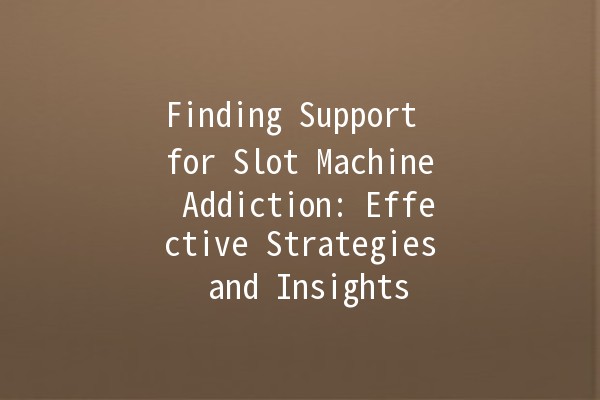Slot machine addiction can be a challenge for many individuals, impacting their financial stability, personal relationships, and overall wellbeing. Recognizing the signs of addiction and seeking help can be the first steps towards recovery. This article intends to provide practical advice and strategies for individuals struggling with slot machine addiction, empowering them to reclaim control over their lives.
Understanding Slot Machine Addiction
Slot machine addiction is characterized by compulsive behavior that drives individuals to play despite the negative consequences. Often, this behavior is not merely about gambling but is intertwined with emotional and psychological factors such as stress, anxiety, or depression. Understanding the root causes of this addiction is crucial in addressing it effectively.

Common Signs of Slot Machine Addiction
Recognizing these signs is vital for both the individual and their loved ones. If you or someone you know exhibits these behaviors, it may be time to seek help.
Effective Strategies to Combat Slot Machine Addiction
Creating and adhering to a strict budget can help individuals control their gambling behavior. This budget should reflect an amount that is affordable and does not impact essential living expenses.
Application Example: If your monthly entertainment budget is $200, allocate a portion for slot machines—say $
Time is often just as valuable as money. Setting a specific timeframe for gambling can prevent excessive play.
Application Example: Decide to play for one hour only and set an alarm. When the alarm goes off, walk away from the machine, regardless of wins or losses.
Many casinos and online platforms offer selfexclusion tools that allow individuals to restrict their access for a specified period. Utilizing these tools can provide a necessary break from gambling.
Application Example: If you find yourself regularly playing at the same casino, consider signing up for their selfexclusion program, which can limit your visits for six months or more.
Therapy and support groups can significantly assist individuals dealing with addiction. Cognitive Behavioral Therapy (CBT) and other therapeutic approaches aim to change gamblingrelated thoughts and behaviors.
Application Example: Look for local support groups such as Gamblers Anonymous (GA), where members share experiences and offer support to each other in a nonjudgmental environment.
Replacing gambling with healthier activities can divert attention away from the slot machines. ding hobbies or interests can fill the time previously spent gambling.
Application Example: Engage in sports, arts and crafts, or volunteering. Join local clubs or groups focused on these activities to build a community and friendships outside of gambling.
Recognizing Triggers
Identifying situations, emotions, or environments that lead to the urge to gamble is crucial for managing addiction. Keeping a journal can help track patterns in behavior.
Common Triggers Include:
Emotional Stress: Feelings of anxiety or depression can lead to gambling as a form of escape.
Social Pressure: Being around individuals who gamble can increase temptation.
Boredom: Lack of engaging activities may drive individuals to seek excitement through gambling.
By understanding these triggers, individuals can develop strategies to handle them without resorting to gambling.
Resources and Support Networks
Online Resources
Several websites offer support, information, and resources for individuals struggling with gambling addiction. These include hotlines, forums, and informational articles.
Local Support Groups
Support groups can provide invaluable peer support and a sense of belonging. Connecting with others who understand your struggle can reduce feelings of isolation.
Professional Counseling
Seeking help from mental health professionals specializing in addiction can provide tailored strategies and support. They can help address underlying psychological issues.
Frequently Asked Questions
What should I do if I realize I have a gambling problem?
If you suspect you might have a gambling problem, the first step is acknowledging the issue. Consider speaking with a mental health professional or contacting a support group such as Gamblers Anonymous for guidance and support.
How can I support a loved one dealing with slot machine addiction?
Supporting a loved one requires sensitivity and understanding. Encourage them to seek professional help and express your concerns compassionately. Avoid judgment, and be patient as recovery can be a lengthy process.
Are there ways to enjoy gambling responsibly?
Yes, responsible gambling techniques include setting budgets and time limits, avoiding highstakes games, and being aware of emotional triggers. Enjoy gambling as a form of entertainment, not as a way to make money.
What are the longterm effects of slot machine addiction?
Longterm effects can include financial ruin, relationship strain, and mental health issues such as anxiety and depression. Recovery often requires a comprehensive approach, addressing these various facets.
Can I recover from slot machine addiction?
Yes, many individuals successfully recover from gambling addiction. It requires commitment, support, and a willingness to change. Many find that joining support groups and participating in therapy leads to healthier coping strategies.
Where can I find additional resources for gambling addiction?
Numerous resources are available, including local support groups, online forums, and mental health professionals specializing in addiction. Websites like the National Council on Problem Gambling offer comprehensive resources and information.
Slot machine addiction can be a profound challenge, but it is not insurmountable. By employing strategic budgeting, limiting time, recognizing triggers, seeking professional help, and building a supportive network, individuals can reclaim their lives and overcome the challenges associated with their addiction. The path to recovery may be difficult, but it is filled with hope and the promise of a brighter future.